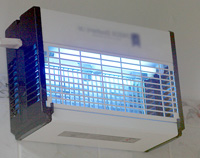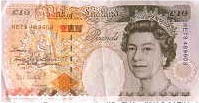|
|
How they're made |
|
|
Ultra-Violet
light is made by special lamps,
for example, on sun beds. It is given off by the Sun
in large quantities. We call it "UV"
for short.
 |
The
photo shows a UV lamp in a chip shop. The lamp gives
off UV (which you can't see) as well as violet light
(which you can see).
The
UV attracts insects, which are electrocuted by high-voltage
wires near the lamp - so they won't land on the food
and contaminate it. |
|
|
 Uses for UV light include getting a sun
tan, detecting forged
bank notes in shops, and hardening some types of
dental filling. Uses for UV light include getting a sun
tan, detecting forged
bank notes in shops, and hardening some types of
dental filling.
You also see UV lamps in clubs, where they make your clothes glow.
This happens because substances in washing powder "fluoresce" when UV light strikes them - they absorb the UV and then re-radiate the energy at a longer wavelength.
Your teeth do the same thing!
The lamps are sometimes called "blacklights" because we can't see the UV coming from them.
When you mark your posessions with a security marker pen, the ink is invisible unless you shine a UV lamp at it.
|
Ultraviolet rays can be used to kill microbes. Hospitals use UV lamps to sterilise surgical equipment and the air in operating theatres.
Food and drug companies also use UV lamps to sterilise their products.
Suitable doses of Ultraviolet rays cause the body to produce vitamin D, and this is used by doctors to treat vitamin D deficiency and some skin disorders.
Something
else to try in a club, with a glass of tonic: UV light makes
the quinine in tonic water glow pale blue.
This
video clip from YouTube shows it clearly :
|
|
|
Large doses of UV can damage the
retina in your eyes, so it's important to check
that your sunglasses will block UV light.
The
cheaper sunglasses tend not to protect you against UV,
and this can be really dangerous. When you wear sunglasses
the pupils of your eye get bigger, because less light
reaches them.
This
means that if your sunglasses don't block UV, you'll
actually get more ultra-violet light in your
eyes than if you didn't wear them, although you won't
notice at the time. So before you buy sunglasses, check
that they offer UV protection! |
Large
doses of UV cause sunburn
and even skin cancer.
Fortunately, the ozone layer in the Earth's atmosphere screens
us from most of the UV given off by the Sun. Think of a sun
tan as a radiation burn! |
|
|
|
|
|
|
|


